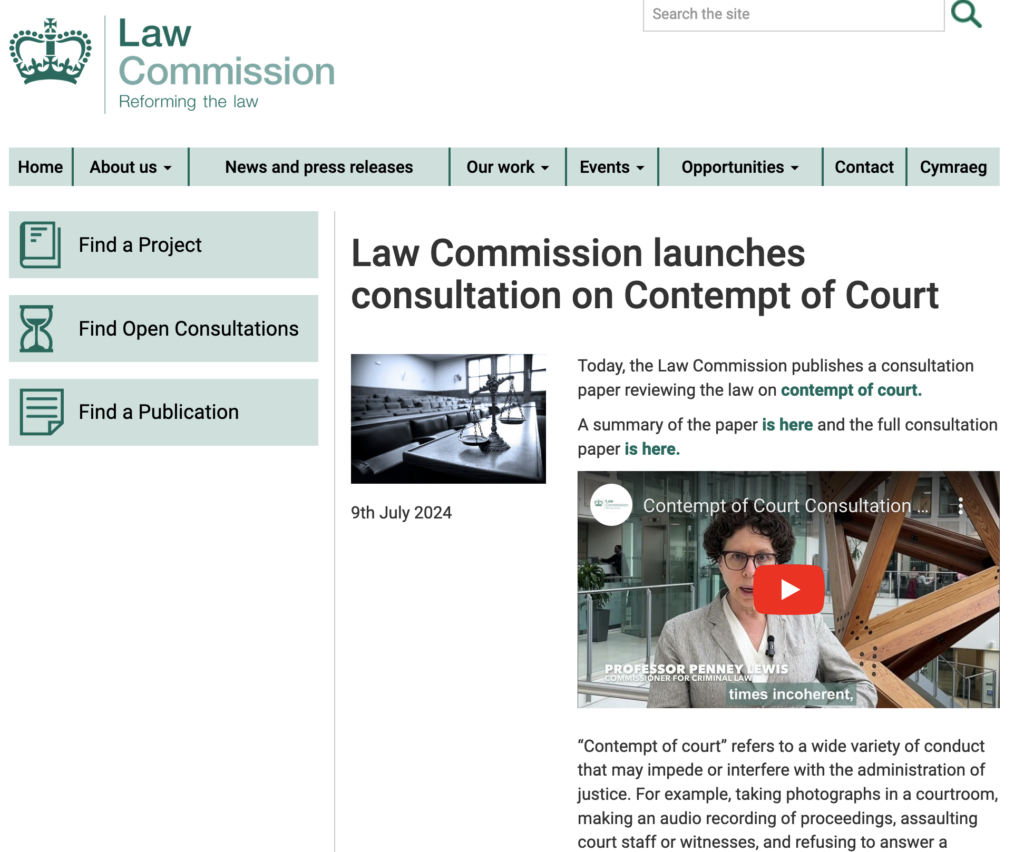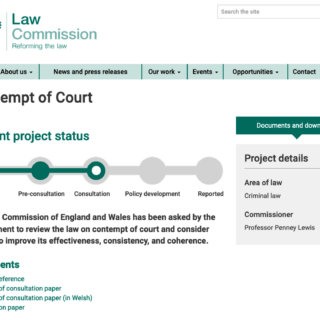
The Law Commission is currently running a public consultation on its proposal to reform the laws surrounding Contempt of Court. They hope to publish their report, along with recommendations for reform in June 2025. The aim of the public consultation is to invite comment and feedback from interested members of the public on the proposed reforms.
As a part of this consultation, I attended a session entitled “Law Commission Consultation on Contempt of Court: Data Protection Issues” held at the Institute of Advanced Legal Studies (IALS) in Russell Square. The session took the form of 3 short presentations, each lasting around 30 minutes, followed by a freeform Q&A where the presenters invited members of the audience to comment on some of the issues that were raised during the sessions.
The first session was run by Professor Penney Lewis and Dr Lawrence MacNamara from the Law Commission. They started by providing some context for why the law needs to be reformed in the first place, and explained some of the issues surrounding the law as it stands. After describing the proposed reforms at a high level, they went on to explore the way data is being shared and handled by the departments responsible for enforcing Contempt of Court: the Attorney-General, the Attorney-General’s Office and the police.

For the second session, they had invited Dr. Jo Easton from Unlock, a charity that provides advice and support for former prisoners, to talk about some of the issues faced by the individuals who come to Unlock for help. Dr. Easton explained how the complex rules around disclosure for former inmates was a serious barrier for their prospects for employment, and how this was compounded by the inconsistent handling of records for Contempt of Court convictions.
The third session was run by Graham Smith from Bird and Bird, a solicitor who has significant expertise in the area of technology and data protection law. Graham focused his attention on the various ways in which the Attorney-General’s Office might be able to acquire the information it requires to perform its statutory duty while still complying with the laws surrounding data protection.
What did I take away?
Contempt of Court is a rather technical area which I have had little cause to examine closely as part of my education so far.
As it transpired, that may have been a blessing in disguise as one of the key themes from the three sessions was inconsistency present in the existing law. In particular, there was attention drawn to the categories of “civil” and “criminal” contempt and the fact that the given labels do not reflect the legal status of either offences.
Perhaps even more surprisingly, the Law Commission speakers asserted that neither “criminal” nor “civil” Contempt of Court are considered to be criminal offences. They described how, in spite of this, some convictions for contempt based offences would still result in a criminal record as a result of being recorded on the Police National Computer (PNC). The main driver for this would frequently be the type of court that the Contempt was tried at, with Criminal Courts being more likely to cause an entry to be registered at the PNC due to extant procedures for doing so.
As Dr. Easton explored in her presentation, the existence of a criminal record can be a significant barrier to the rehabilitation of former convicts. Various offences have different rules around the disclosure requirements, and minor offences become spent after a number of years, with spent convictions no longer requiring disclosure. However, the habit of employers researching employees on the internet has resulted in employees being dismissed due to failing to disclose spent offences. As you can imagine, this not only creates challenges to the concept of rehabilitative justice, but it also disproportionately affects individuals with unusual or unique names, creating further injustice.
Final thoughts
As for the event itself, this was quite a heavy hitting event, and one to be approached with both eyes open with regards to what to expect. One of the unique aspects of the legal profession is that it is constantly evolving in response to real world challenges. It is a wonderful privilege to have a chance to contribute to proposals that might one day become law, as well as being able to hear the discourse of practitioners who are on the cutting edge of a particular area of law.

The Law Commission’s public consultation period for the reforms to Contempt of Court closes on the 29th November 2024. You can also find versions of the report on the Ministry of Justice’s webpage for the project. There you can find details on how to contribute to the discussion.
Thanks to Vincent Chan for this excellent review. Before doing his GDL at City, Vince worked for over 10 years as a software engineer in the financial services industry. Lawbore is excited about having Vince on the journalist team this year and exploiting his tech knowledge.

